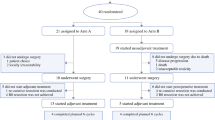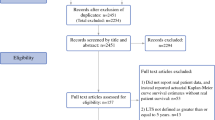Abstract
Background and objectives
The objective of this study was to investigate the benefits of adjuvant treatment for patients with resected perihilar cholangiocarcinoma (PHC).
Methods
Between 2001 and 2017, 196 patients with PHC adenocarcinoma underwent curative resection. The patients were divided into four groups according to adjuvant treatment type: surgery alone (S; N = 90), surgery with chemotherapy (S+CTx; N = 67), surgery with radiotherapy (S+RTx; N = 18), and surgery with chemoradiotherapy (S+ CRTx; N = 21).
Results
The median follow-up duration of the surviving patients was 58 months. The 5-year rate of overall survival (OS) was 32%. In multivariate analysis, receiving S+CTx and S+CRTx were significant prognostic factors for OS. In subgroup analyses of the R1 resection patients, the S+CRTx group showed better OS than the S group (p < 0.05). In subgroup analyses of the stage III–IVA patients with a negative resection margin, the S+CTx and S+CRTx groups showed superior OS than the S group (p < 0.05).
Conclusions
Our data suggest that adjuvant chemoradiotherapy might be considered for PHC patients with R1 resection. Adjuvant chemotherapy or chemoradiotherapy is suggested for stage III–IVA patients with R0 resection. The results of this study require validation through further prospective studies.



Similar content being viewed by others
References
Ben-Josef E, Guthrie KA, El-Khoueiry AB et al (2015) SWOG S0809: A Phase II Intergroup Trial of adjuvant capecitabine and gemcitabine followed by radiotherapy and concurrent capecitabine in extrahepatic cholangiocarcinoma and gallbladder carcinoma. J Clin Oncol 33(24):2617–2622
Bridgewater JA, Goodman KA, Kalyan A, Mulcahy MF (2016) Biliary tract cancer: epidemiology, radiotherapy, and molecular profiling. Am Soc Clin Oncol Educ Book 35:e194-203
Cheng Q, Luo X, Zhang B, Jiang X, Yi B, Wu M (2007) Predictive factors for prognosis of hilar cholangiocarcinoma: postresection radiotherapy improves survival. Eur J Surg Oncol 33(2):202–207
de Groen PC, Gores GJ, LaRusso NF, Gunderson LL, Nagorney DM (1999) Biliary tract cancers. N Engl J Med 341(18):1368–1378
Edeline J, Benabdelghani M, Bertaut A et al (2019) Gemcitabine and oxaliplatin chemotherapy or surveillance in resected biliary tract cancer (PRODIGE 12-ACCORD 18-UNICANCER GI): a randomized phase III study. J Clin Oncol 37(8):658–667
Giobbie-Hurder A, Gelber RD, Regan MM (2013) Challenges of guarantee-time bias. J Clin Oncol 31(23):2963–2969
Groot Koerkamp B, Wiggers JK, Allen PJ et al (2015) Recurrence rate and pattern of perihilar cholangiocarcinoma after curative intent resection. J Am Coll Surg 221(6):1041–1049
Horgan AM, Knox JJ (2018) Adjuvant therapy for biliary tract cancers. J Oncol Pract 14(12):701–708
Hu HJ, Mao H, Shrestha A, Tan YQ, Ma WJ, Yang Q, Wang JK, Cheng NS, Li FY (2016) Prognostic factors and long-term outcomes of hilar cholangiocarcinoma: a single-institution experience in China. World J Gastroenterol 22(8):2601–2610
Jarnagin WR, Ruo L, Little SA, Klimstra D, D’Angelica M, DeMatteo RP, Wagman R, Blumgart LH, Fong Y (2003) Patterns of initial disease recurrence after resection of gallbladder carcinoma and hilar cholangiocarcinoma: implications for adjuvant therapeutic strategies. Cancer 98(8):1689–1700
Kang MJ, Jang JY, Chang J, Shin YC, Lee D, Kim HB, Kim SW (2016) Actual long-term survival outcome of 403 consecutive patients with hilar cholangiocarcinoma. World J Surg 40(10):2451–2459
Keane FK, Zhu AX, Hong TS (2018) Radiotherapy for biliary tract cancers. Semin Radiat Oncol 28(4):342–350
Komaya K, Ebata T, Yokoyama Y, Igami T, Sugawara G, Mizuno T, Yamaguchi J, Nagino M (2018) Recurrence after curative-intent resection of perihilar cholangiocarcinoma: analysis of a large cohort with a close postoperative follow-up approach. Surgery 163(4):732–738
Krasnick BA, Jin LX, Davidson JT et al (2018) Adjuvant therapy is associated with improved survival after curative resection for hilar cholangiocarcinoma: a multi-institution analysis from the U.S. extrahepatic biliary malignancy consortium. J Surg Oncol 117(3):363–371
Lee JH, Hwang DW, Lee SY, Park KM, Lee YJ (2012) The proximal margin of resected hilar cholangiocarcinoma: the effect of microscopic positive margin on long-term survival. Am Surg 78(4):471–477
Mizuno T, Ebata T, Yokoyama Y, Igami T, Sugawara G, Yamaguchi J, Nagino M (2017) Adjuvant gemcitabine monotherapy for resectable perihilar cholangiocarcinoma with lymph node involvement: a propensity score matching analysis. Surg Today 47(2):182–192
Nassour I, Mokdad AA, Porembka MR, Choti MA, Polanco PM, Mansour JC, Minter RM, Wang SC, Yopp AC (2018) Adjuvant therapy is associated with improved survival in resected perihilar cholangiocarcinoma: a propensity matched study. Ann Surg Oncol 25(5):1193–1201
Primrose JN, Fox RP, Palmer DH et al (2019) Capecitabine compared with observation in resected biliary tract cancer (BILCAP): a randomised, controlled, multicentre, phase 3 study. Lancet Oncol 20(5):663–673
Shroff RT, Kennedy EB, Bachini M et al (2019) adjuvant therapy for resected biliary tract cancer: ASCO clinical practice guideline. J Clin Oncol 37(12):1015–1027
Acknowledgments
This work has been presented in the third Asia-Pacific Cholangiocarcinoma Conference, March 15–16, 2019, Taipei, Taiwan. The abstract of this study was accepted for poster presentation at the Annual Meeting of the American Society for Radiation Oncology, Chicago, IL (September, 2019). We would like to thank Editage (www.editage.co.kr) for English language editing.
Author information
Authors and Affiliations
Corresponding author
Ethics declarations
Conflict of interest
The authors declare that there are no conflict of interests.
Additional information
Publisher's Note
Springer Nature remains neutral with regard to jurisdictional claims in published maps and institutional affiliations.
Supplementary Information
Below is the link to the electronic supplementary material.
Rights and permissions
About this article
Cite this article
Im, J.H., Choi, G.H., Lee, W.J. et al. Adjuvant radiotherapy and chemotherapy offer a recurrence and survival benefit in patients with resected perihilar cholangiocarcinoma. J Cancer Res Clin Oncol 147, 2435–2445 (2021). https://doi.org/10.1007/s00432-021-03524-7
Received:
Accepted:
Published:
Issue Date:
DOI: https://doi.org/10.1007/s00432-021-03524-7




